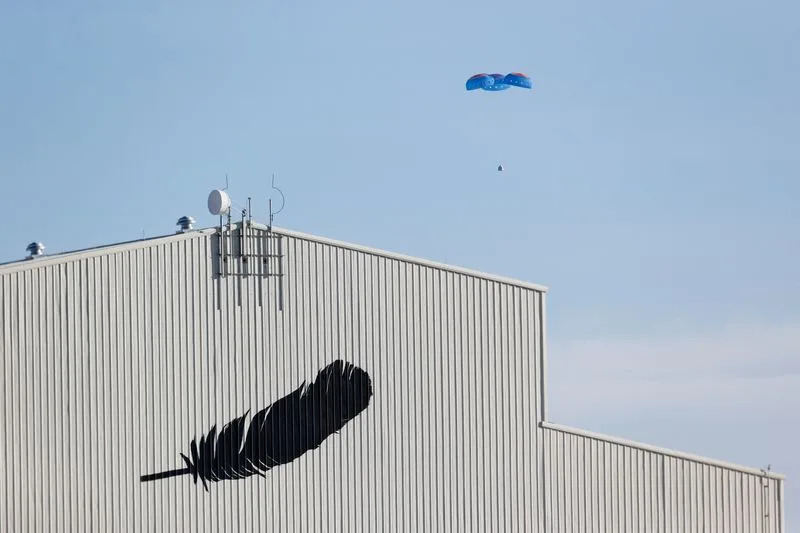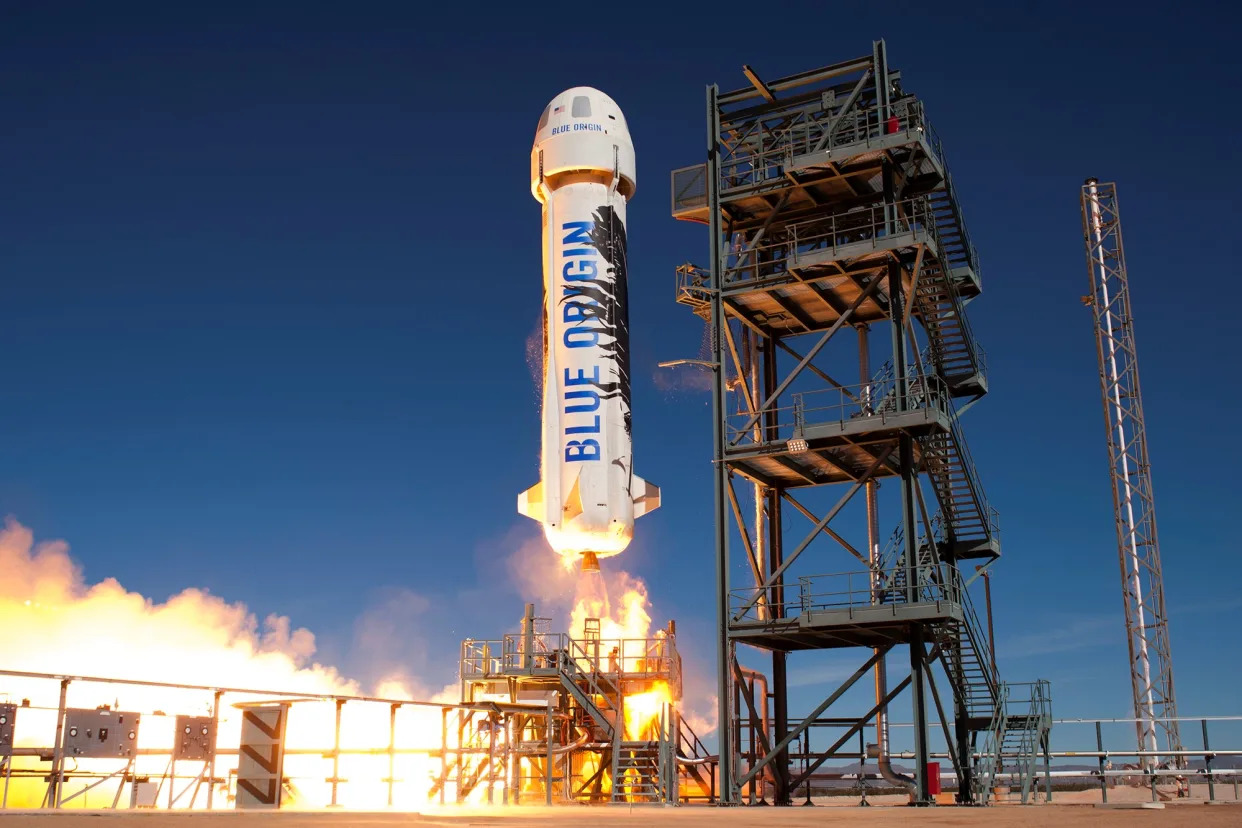Joey Roulette
Updated Wed, September 27, 2023

Blue Origin's rocket New Shepard blasts off, near Van Horn, Texas
By Joey Roulette
WASHINGTON (Reuters) -The U.S. Federal Aviation Administration said on Wednesday it has closed a probe into Blue Origin's 2022 New Shepard rocket failure, forcing a redesign of the vehicle's engine and other fixes before the company can resume its suborbital launch business.
Blue Origin must take 21 corrective actions before its reusable New Shepard rocket can return to flight, including a "redesign of engine and nozzle components to improve structural performance during operation as well as organizational changes," the FAA said.
A Blue Origin spokesperson said "we've received the FAA's letter and plan to fly soon" but did not answer questions on whether any of the corrective actions had already been made or what organizational changes the FAA is requiring.
The New Shepard, which flies cargo and humans on short trips to the edge of space, has been grounded since a September 2022 uncrewed mission failed roughly a minute after liftoff from Texas, forcing the rocket's capsule full of NASA experiments to safely eject mid-flight.
In March, Blue Origin said New Shepard would fly "soon" after concluding the mishap was caused by a "structural failure" in the rocket's engine nozzle, which had been contorted during flight by hotter-than-normal temperatures coming out of the engine's combustion chamber.
The FAA, which regulates launch site safety and oversees mishap investigations led by rocket companies, cited the same conclusion as Blue Origin's in its statement on Wednesday. The company cannot obtain a license to fly until it demonstrates all the required fixes have been made, it added.
The failure occurred on New Shepard's 23rd flight from rural Van Horn, Texas, as flights with the 60-foot (18-meter) tall rocket-capsule system were becoming routine. The company has flown multiple crews of people, including paying customers and its founder, Jeff Bezos.
(Reporting by Joey Roulette; Editing by Leslie Adler, David Gregorio and Richard Chang)
FAA closes investigation into Blue Origin rocket failure and demands changes before next launch
Andrew Wulfeck
Wed, September 27, 2023
VAN HORN, Texas – The Federal Aviation Administration says Blue Origin must implement nearly two dozen corrective actions before the private space company tries again to launch its New Shepard suborbital vehicle from its West Texas launch facility.
The federal agency released limited details of its investigation on Wednesday, more than a year after a spectacular failure caused a booster to crash into Earth on Sept. 12, 2022.
During the event, the company said the launch vehicle detected an anomaly, triggering the uncrewed mission to abort.
While the capsule landed safely, the booster was destroyed just over one minute after launch.
Investigations by Jeff Bezos’ Blue Origin and the FAA found that structural failures of an engine nozzle likely played a significant role in operating temperatures.
"The closure of the mishap investigation does not signal an immediate resumption of New Shepard launches. Blue Origin must implement all corrective actions that impact public safety and receive a license modification from the FAA that addresses all safety and other applicable regulatory requirements prior to the next New Shepard launch," the FAA said in a statement.
Specifics from the investigation were not released because the FAA said the report contained proprietary data, but the agency did consult with NASA and the National Transportation Safety Board.
BLUE ORIGIN CAPSULE ABORTS MID-LAUNCH AFTER NEW SHEPARD ROCKET ANOMALY IN TEXAS
The private space company previously said it planned to return to flying in late 2023, but a spokesperson’s statement following the latest news from the FAA produced more questions than answers.
"We’ve received the FAA’s letter and plan to fly soon," a Blue Origin representative said.
Blue Origin has not stated when it plans to restart crewed flights for seats that originally cost upwards of $28 million.
The company had offered 10-minute spaceflights for tourists to experience brief weightlessness and had launched more than 30 people into suborbital space before the mishap.
Regulators close investigation into Blue Origin's New Shepard anomaly
Aria Alamalhodaei
Updated Thu, September 28, 2023

Image Credits: Blue Origin
The U.S. Federal Aviation Administration has closed the investigation into a mishap that occurred last September during a launch of Blue Origin’s New Shepard vehicle, with the regulator saying that Blue Origin must implement 21 corrective actions before it can fly New Shepard again.
New Shepard was grounded after a September 2022 launch ended with an abort about a minute after liftoff. The vehicle’s capsule, which was not filled with people, had to conduct an emergency parachute landing to clear the booster. It landed safely while the propulsion module was destroyed on impact with the ground. There were no injuries to Blue Origin personnel.
In an emailed statement, a representative for the FAA said the anomaly was caused by a “structural failure of an engine nozzle caused by higher than expected engine operating temperatures.” Among the 21 corrective actions includes redesigning the engine and nozzle components as well as “organizational changes.”
In response to TechCrunch’s inquiries into the corrective actions, a Blue Origin spokesperson simply said, “We’ve received the FAA’s letter and plan to fly soon.”
The closure of the mishap investigation does not mean that Blue Origin can immediately start flying New Shepard. The company must implement all the corrective actions and receive a launch license modification from the FAA first, the FAA spokesperson said.
Mishap investigations are conducted by the companies and overseen by the FAA, the agency that issues commercial space licenses and is responsible for ensuring the safety to the public during commercial launch activities.
When Blue Origin released a report on the mishap back in March, it simply said it expected to fly "soon." But that was six months ago, so it's unclear when New Shepard will be ready to fly next.
No comments:
Post a Comment